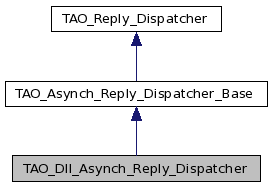Reply dispatcher for DII asynch requests. More...
#include <DII_Reply_Dispatcher.h>


Public Member Functions | |
| TAO_DII_Asynch_Reply_Dispatcher (const Messaging::ReplyHandler_ptr callback, TAO_ORB_Core *orb_core) | |
| virtual | ~TAO_DII_Asynch_Reply_Dispatcher (void) |
| virtual int | dispatch_reply (TAO_Pluggable_Reply_Params ¶m) |
| The Reply_Dispatcher methods. | |
| virtual void | connection_closed (void) |
Private Attributes | |
| char | buf_ [ACE_CDR::DEFAULT_BUFSIZE] |
| The buffer that is used to initialise the data block. | |
| ACE_Data_Block | db_ |
| TAO_InputCDR | reply_cdr_ |
| CDR stream for reading the input. | |
| const Messaging::ReplyHandler_ptr | callback_ |
| Where the reply needs to go. | |
Reply dispatcher for DII asynch requests.
Definition at line 81 of file DII_Reply_Dispatcher.h.
| TAO_DII_Asynch_Reply_Dispatcher::TAO_DII_Asynch_Reply_Dispatcher | ( | const Messaging::ReplyHandler_ptr | callback, | |
| TAO_ORB_Core * | orb_core | |||
| ) |
Definition at line 128 of file DII_Reply_Dispatcher.cpp.
: TAO_Asynch_Reply_Dispatcher_Base (orb_core), db_ (sizeof buf_, ACE_Message_Block::MB_DATA, this->buf_, orb_core->input_cdr_buffer_allocator (), orb_core->locking_strategy (), ACE_Message_Block::DONT_DELETE, orb_core->input_cdr_dblock_allocator ()), reply_cdr_ (&db_, ACE_Message_Block::DONT_DELETE, TAO_ENCAP_BYTE_ORDER, TAO_DEF_GIOP_MAJOR, TAO_DEF_GIOP_MINOR, orb_core), callback_ (callback) { }
| TAO_DII_Asynch_Reply_Dispatcher::~TAO_DII_Asynch_Reply_Dispatcher | ( | void | ) | [virtual] |
Definition at line 149 of file DII_Reply_Dispatcher.cpp.
{
// this was handed to us by the caller.
CORBA::release(callback_);
}
| void TAO_DII_Asynch_Reply_Dispatcher::connection_closed | ( | void | ) | [virtual] |
The used for the pending reply has been closed. No reply is expected.
Implements TAO_Reply_Dispatcher.
Definition at line 211 of file DII_Reply_Dispatcher.cpp.
{
try
{
// Generate a fake exception....
CORBA::COMM_FAILURE comm_failure (0,
CORBA::COMPLETED_MAYBE);
TAO_OutputCDR out_cdr;
comm_failure._tao_encode (out_cdr);
// Turn into an output CDR
TAO_InputCDR cdr (out_cdr);
CORBA::Request::_tao_reply_stub (
this->reply_cdr_,
this->callback_,
GIOP::SYSTEM_EXCEPTION);
}
catch (const CORBA::Exception& ex)
{
if (TAO_debug_level >= 4)
{
ex._tao_print_exception (
"DII_Asynch_Reply_Dispacher::connection_closed");
}
}
this->intrusive_remove_ref (this);
}
| int TAO_DII_Asynch_Reply_Dispatcher::dispatch_reply | ( | TAO_Pluggable_Reply_Params & | param | ) | [virtual] |
The Reply_Dispatcher methods.
Implements TAO_Reply_Dispatcher.
Definition at line 156 of file DII_Reply_Dispatcher.cpp.
{
this->reply_status_ = params.reply_status ();
this->locate_reply_status_ = params.locate_reply_status ();
// Transfer the <params.input_cdr_>'s content to this->reply_cdr_
ACE_Data_Block *db =
this->reply_cdr_.clone_from (*params.input_cdr_);
// See whether we need to delete the data block by checking the
// flags. We cannot be happy that we initally allocated the
// datablocks of the stack. If this method is called twice, as is in
// some cases where the same invocation object is used to make two
// invocations like forwarding, the release becomes essential.
if (ACE_BIT_DISABLED (db->flags (),
ACE_Message_Block::DONT_DELETE))
db->release ();
// Steal the buffer, that way we don't do any unnecesary copies of
// this data.
CORBA::ULong max = params.svc_ctx_.maximum ();
CORBA::ULong len = params.svc_ctx_.length ();
IOP::ServiceContext* context_list = params.svc_ctx_.get_buffer (1);
this->reply_service_info_.replace (max, len, context_list, 1);
if (TAO_debug_level >= 4)
{
ACE_DEBUG ((LM_DEBUG,
ACE_TEXT ("(%P | %t):")
ACE_TEXT ("TAO_DII_Asynch_Reply_Dispatcher::dispatch_reply: status = %d\n"),
this->reply_status_));
}
try
{
// Call the handler with the reply data.
CORBA::Request::_tao_reply_stub (this->reply_cdr_,
this->callback_,
this->reply_status_);
}
catch (const CORBA::Exception& ex)
{
if (TAO_debug_level >= 4)
{
ex._tao_print_exception ("Exception during reply handler");
}
}
// This was dynamically allocated. Now the job is done.
this->intrusive_remove_ref (this);
return 1;
}
char TAO_DII_Asynch_Reply_Dispatcher::buf_[ACE_CDR::DEFAULT_BUFSIZE] [private] |
The buffer that is used to initialise the data block.
Reimplemented from TAO_Asynch_Reply_Dispatcher_Base.
Definition at line 97 of file DII_Reply_Dispatcher.h.
const Messaging::ReplyHandler_ptr TAO_DII_Asynch_Reply_Dispatcher::callback_ [private] |
Where the reply needs to go.
Definition at line 107 of file DII_Reply_Dispatcher.h.
Datablock that is created on the stack to initialise the CDR stream underneath.
Reimplemented from TAO_Asynch_Reply_Dispatcher_Base.
Definition at line 101 of file DII_Reply_Dispatcher.h.
CDR stream for reading the input.
Reimplemented from TAO_Asynch_Reply_Dispatcher_Base.
Definition at line 104 of file DII_Reply_Dispatcher.h.
 1.7.0
1.7.0